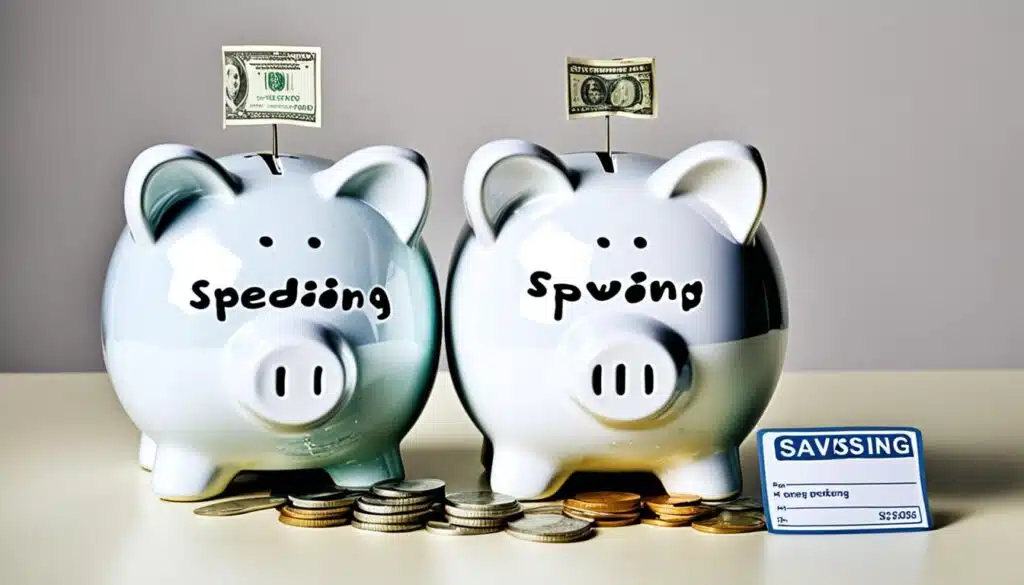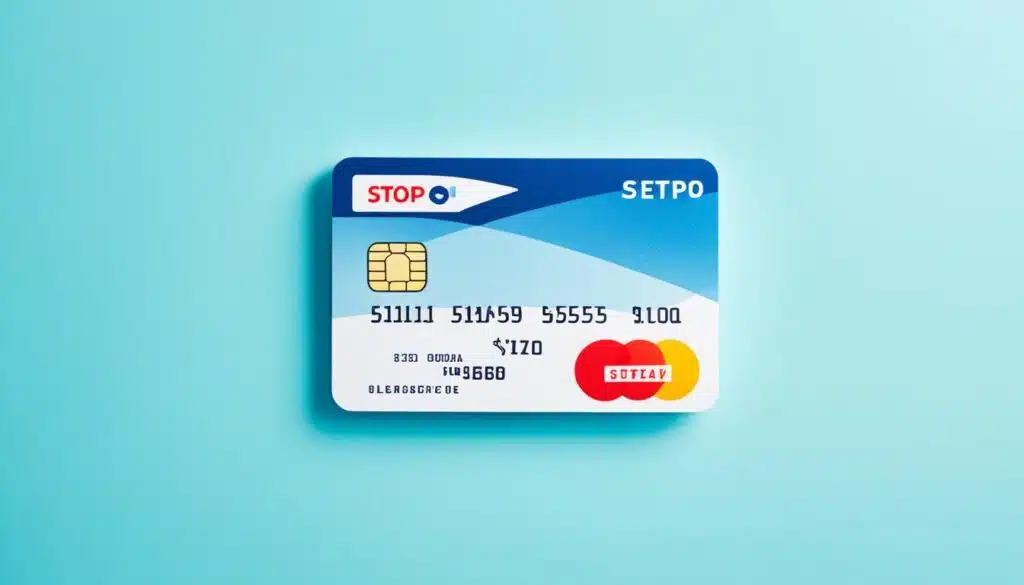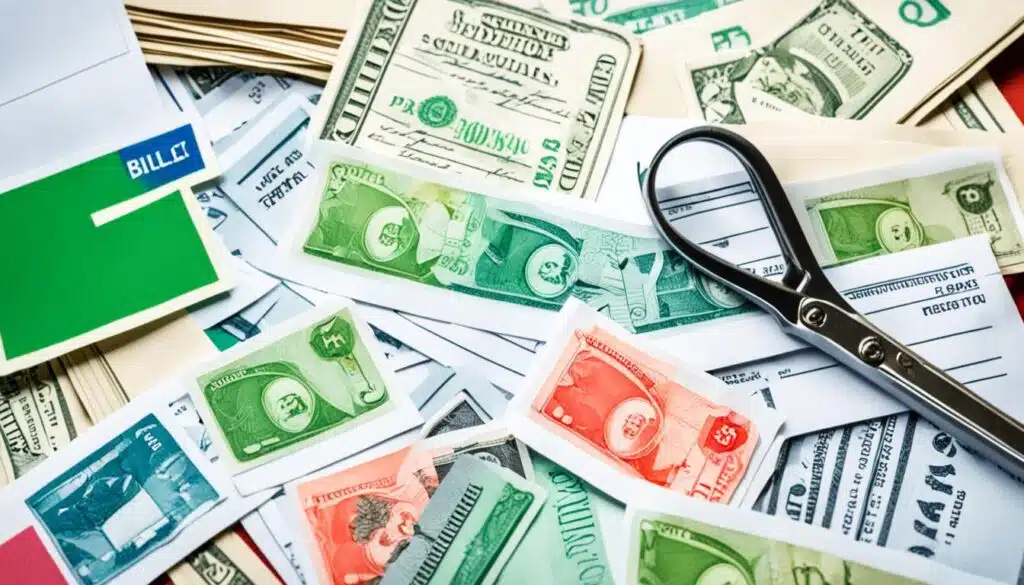Tips For Saving Money Managing your money in today’s world can be tough. But, with the right steps and some discipline, you can save cash. This guide will show you easy ways to improve your money habits and build a safer financial future.
Key Takeaways
- Develop a budget and track your income and expenses
- Identify areas where you can cut back on spending
- Prioritise eliminating debt before saving
- Automate your savings and bill payments
- Explore ways to reduce housing and utility costs
Learn to Budget and Understand Your Finances
Building a strong budgeting plan is key to handle your finance management. It lets you manage money better. Knowing how to budget right helps cut expenses, meet savings goals, and boost your financial health.
Keep Track of Income and Expenses
Start by listing all your expenses and noting your income. Use your salary slips, bank statements, and receipts. Sort your spending into fixed and variable items. This way, you can see clearly where your cash goes and find areas to spend less.
Separate Fixed and Variable Costs
It’s important to split your costs into fixed and variable ones for a good budget. The fixed costs usually stay the same. Think of things like rent, mortgage, and insurance. Variable costs change, like food, travel, or fun.
Identify Areas for Cutting Back
After listing your expenses, look at those that change. Find ways to spend less on things you may not need. This could be fewer nights out or cheaper hobbies.
Assess Progress Regularly
Keeping up with your budget is crucial. Check often to see if you’re sticking to your plan. Make changes if you’re spending more than you should. This keeps you on the right path.
Understanding your money better, making a budget, and checking your progress all help you spend wisely. It’s the first step to hit your personal finance goals.
Also Read :Smart Money Moves: Best Ways To Invest Money
Eliminate Debt Before Saving
First thing’s first: clear your debts before aiming to save. This step is key in improving your money situation. It lets you put more towards saving. Debt holds you back from reaching your financial dreams.
Utilise the 50/30/20 Budgeting Rule
The 50/30/20 budgeting rule is a great way to manage your money and get rid of debts. It splits your income into three parts:
- Necessities (50%): Spend 50% on must-haves like rent and groceries.
- Discretionary Spending (30%): Use 30% on fun things like going out or hobbies.
- Savings and Debt Repayment (20%): Put 20% towards savings and paying off debts.
This rule helps ensure you work on your debts while still meeting your needs. It also allows for a bit of fun spending. With this balance, you create good financial habits for the future.
“The key to successful debt management is to tackle it head-on, rather than letting it accumulate and weigh you down. By prioritising debt repayment, you’re taking a crucial step towards financial freedom.”
Getting rid of debt takes time, but sticking to the 50/30/20 budget will help. With steady budgeting, you will get closer to managing your debt and saving as you want.
Also Read :What Are The Best Ways To Earn Money From Home?
Separate Spending and Savings Accounts

In the world of personal finance, keeping spending and savings accounts separate is smart. This method helps you manage money better. It keeps your savings safe from spending on a whim.
Using different bank accounts for your daily spending and long-term savings is key. A spending account helps you see and control your daily costs. While a savings account locks away money for future dreams, keeping it away from unplanned buys.
This system sets clear lines between what you spend now and what you save for later. It makes you think twice about using your savings for everyday needs. By moving money from spending to savings automatically, you can save without even trying.
“Separate your spending and savings accounts to avoid the temptation of dipping into your savings for everyday expenses.”
Also, having separate accounts can show you how you spend. It helps to spot areas where you can spend less, seeing where to cut back. This way, you can put more money towards what you really want to save for.
To wrap up, having different spending and savings accounts can do wonders for your financial health. It helps you build a better connection with your money. It guards your savings and gets you closer to your money dreams.
Also Read : How Should I Start Investing Money?
Automate Your Savings

Setting up automatic transfers from your spending account to your savings can change the game. You make saving easier, more stable, and less likely to miss a beat. This way, passive saving becomes your new best friend, encouraging good financial habits with the help of money management tools.
Automating savings is all about making life easier. You don’t have to move money around every month or week. It’s like putting your savings on autopilot. This strategy keeps you focused on your saving goals, knowing your money is safe before the temptation to spend hits.
Banks and financial apps have cool features that let you automatically save. With “Rules,” you choose how much of your income goes straight to savings. This way, you save without lifting a finger every time you get paid.
By hiding your savings from everyday view, you’re less likely to use them for unplanned costs. The money stays safe and untouched, there for true emergencies only.
Automating savings is key to growing wealth. It combines the usefulness of money management tools with the power of discipline in saving. Thus, you’re on your way to meet your financial dreams, one deposit at a time.
“Automating your savings is like putting your financial future on autopilot – it’s a simple yet effective way to build wealth without the constant effort.”
Also Read : What Are The Best Strategies For Real Estate Investing?
Automate Bill Payments

Setting up automatic bill payments can change how you manage money. It helps avoid late fees. You won’t need to worry about remembering every due date. Your bills will be paid on time each month.
Automated payments make life easier. You don’t have to go into each account to pay. Just set it up once and your bank or service provider does the work for you. This frees up your time and lightens your financial load.
- Avoid late fees and penalties by ensuring on-time payments every month.
- Improve your overall financial organisation by streamlining the bill-paying process.
- Free up time and mental energy that would otherwise be spent on manually paying bills.
Starting to automate your bill payments is easy. Contact your service providers or use your online banking. They usually have the option for regular payments. Check the details and make sure the right amount is withdrawn on time.
“Automating your bill payments is a simple yet powerful way to take control of your finances and ensure you never miss a payment again.”
Even with automated payments, checking your accounts is still vital. Make sure everything is working fine. This avoids surprises later on.
By using automatic payments, you make life simpler. You reduce late fees and can concentrate on other things. Start today and enjoy a more organised and stress-free future.
Also Read :What Are The Most Effective Long-term Investment Strategies?
Set Spending Limits on Cards

Controlling spending can be hard, especially with cards. But, it helps to set limits. This way, you can avoid buying things on a whim and keep your spending in check.
Setting daily or monthly limits on your cards is smart. It helps you stick to your budget and not spend too much. This makes you more responsible with money and helps form good spending habits.
Daily Spending Limits
It’s useful to have daily limits on how much you spend. This is great, especially if you often buy things without planning to. By setting a daily cap, you make sure you spend only what you’ve budgeted for and not more.
Monthly Spending Limits
Monthly spending caps are also helpful. They let you use your money more wisely. You know exactly how much you can spend each month. This way, you avoid going into debt and can focus on your long-term financial goals.
| Spending Limit | Debit Card | Credit Card |
|---|---|---|
| Daily | £50 | £100 |
Try the Envelope Budgeting System

Do you find it hard to stop your overspending? The envelope budgeting system might be just what you need. This method uses cash for all your expenses. Each expense has its envelope. This way, you see and control your spending clearly.
Handling cash makes you think harder about your money. Instead of just moving money digitally, you move real cash. Moving money by hand makes you really think before spending. It makes you less likely to buy things on a whim.
This method helps you understand where your money goes. You can sort your money for different things like groceries and fun times. This clarity helps you see where you can spend less. It’s a great way to take control of your money habits.
To start, work out how much you earn each month. Then, divide this money into the envelopes you’ve set. Make sure to use the right money for the right things. When you spend, take the money from the right envelope. This way, you stick to your planned spending.
It’s true that using envelopes is more work than just tracking things online. But, it works wonders for those who want to see their money clearly. Knowing exactly where your money goes helps you make better money choices. It can also help you save more.
“The envelope budgeting system is a game-changer for people who want to take a more active role in managing their finances. It’s a simple, yet powerful, tool that can help you stay on track with your spending and save more money in the long run.”
Reduce Housing Costs

Housing costs usually take up the biggest part of a monthly budget. There are several ways to cut them down and save more money.
Consider Sharing Accommodation
Sharing a place with one or more flatmates is a smart move. This shared accommodation helps divide the cost, saving you a lot every month. It’s great for young working people or those just starting. You get to live in a nice place and not spend as much.
Downsize to a Smaller Room
Choosing a smaller place can also lower your housing expenses. Moving to a studio, a small flat, or less spacious house can save you money. It means you might have to change a few things about how you live. But the savings will help you meet other financial goals.
“Reducing housing costs is one of the most effective ways to improve your overall financial health and increase your savings.”
Looking into sharing and downsizing can really cut your monthly spending. This money can then help meet other important financial goals or build up your savings for tough times.
Tips For Saving Money

Lowering your utility bills can save you a lot. By changing a few things, you cut your costs and improve your money situation. Here are tips to help you save on energy.
Change Energy Providers
Switching to a cheaper energy company can reduce your bills. Compare the rates of suppliers near you. This easy step could save you a lot of money, which you can use for other things.
Use Energy-Efficient Bulbs
Switching from old to LED light bulbs saves energy. LED bulbs use less power but offer as much light. This change can lower your bills noticeably.
Invest in a Smart Thermostat
A smart thermostat can make your home more energy efficient. It lets you control your home’s temperature better. It learns your habits and uses less energy, saving you money.
Seal Air Leaks
Sealing leaks around doors and windows makes your home more efficient. Good insulation keeps the air in, saving energy. This simple fix can cut your bills over time.
| Energy Savings Tip | Potential Savings |
|---|---|
| Change Energy Providers | Up to 20% on utility bills |
| Use Energy-Efficient Bulbs | Up to 80% on lighting costs |
| Invest in a Smart Thermostat | Up to 15% on heating and cooling costs |
| Seal Air Leaks | Up to 30% on heating and cooling costs |
Follow these tips to reduce how much energy you use. This will save you money on your bills. Remember, even small changes can make a big impact on your finances.
Take Up a Side Hustle

Today, starting a side hustle is smart for extra cash and financial diversification. Need to pay off debts or save more? A side job helps with extra money.
A side hustle fits around your life. You can pick from freelance work to part-time jobs. Do what you like and make more money for savings.
Explore Side Hustle Opportunities
Want to start a side job? Think about these options:
- Freelance writing, graphic design, or web development
- Selling handmade crafts or products online
- Driving for a ridesharing service or delivering food
- Renting out a spare room or your home on a short-term basis
- Providing tutoring or teaching classes in your area of expertise
Find a hustle you love. It should match what you’re good at and passionate about. This way, you enjoy the work and earn more.
“A side hustle can be the difference between simply surviving and truly thriving financially.”
A side hustle helps with more than money. It makes your income sources varied. This helps to be more financially secure and successful in the future.
Cancel Unused Subscriptions

In the digital era, subscription management is key to saving money. We often sign up for many services, from Netflix to magazines online. However, these costs can build up without us even noticing. By regularly checking and canceling unused subscriptions, we can find big ways to save. This helps us take back control of our budgets.
How come we keep subscriptions we don’t use? It’s because of the sunk-cost fallacy. We think we’re saving money by keeping them. But in truth, unused subscriptions only drag our finances down. They stop us from using that money for things we need more.
- First, look at all your monthly spendings. See if each subscription is really necessary.
- Next, find those you haven’t used in months. You might not need them. Cancel to save more for what matters most.
- Watch out for free trials turning into paid subscriptions. Make sure to cancel them on time to avoid extra costs.
- Try to combine similar services. For example, use one streaming service instead of several. This makes it easier to track spending.
Taking charge of your subscription management improves your financial health. It lets you spend on real goals. Save every penny by removing unused subscriptions. This takes you closer to your dreams.
| Subscription | Monthly Cost | Last Used | Action |
|---|---|---|---|
| Netflix | £9.99 | Last week | Keep |
| Spotify | £5.99 | Yesterday | Keep |
| The Economist | £12.99 | 2 months ago | Cancel |
| Fitness App | £7.99 | 4 months ago | Cancel |
“Cutting back on unnecessary subscriptions is one of the easiest ways to reduce your monthly expenses and boost your savings.”
Also Read: Smart Strategies: A Guide To Money Saving
Conclusion
This article has shared many tips for saving money. These suggestions can help you reach your financial goals. By using these ideas, you can form positive money habits, cut down on wasteful spending, and strengthen your finances.
It’s important to begin with small steps and keep going. You need to check and change your money plans regularly. This could involve setting a budget, paying off debt, saving automatically, or finding ways to spend less. Every little action helps to save more in the long run and achieve your financial dreams.
Following the tips in this guide can put you in charge of your money. It will help you make the most out of your saving efforts. You’re on your way to a more secure financial future. Just remember, managing your money well is an ongoing journey. So, stick with it, adjust as you go, and revel in the benefits of good money skills.
FAQs
What is the importance of creating a budget?
Creating a budget is key to saving money. It tracks your income and spending, separating various costs. This helps find areas to spend less and sets savings goals. Knowing your financial situation helps make smart choices and reduce frivolous spending.
Why is it important to eliminate debt before focusing on savings?
It’s crucial to clear debts before saving. Doing so frees up money for savings and speeds up reaching financial goals. The 50/30/20 budget rule suggests how much to spend on needs, wants, and saving or debt pay-off.
How can separating spending and savings accounts help with saving money?
Having different accounts for spending and saving stops spending savings on daily needs. It’s vital to have a dedicated savings account and automate savings. This protects savings from being spent impulsively.
What are the benefits of automating savings?
Automating savings makes saving money easier and more regular. This method discusses in-app tools like Rules for automatic account transfers. It’s a hands-off way to manage savings.
How can setting spending limits on debit and credit cards help with budgeting?
Limiting spending on cards helps avoid overspending and sticking to a budget. This advice mentions setting daily or monthly spending limits. It stops buying things that are not in the budget.
What are the advantages of the envelope budgeting system?
The envelope budget system, using cash in labelled envelopes, aids those who spend too much. It helps keep to a budget by limiting spending in each category. With this method, people stay within their budget.
How can reducing housing costs lead to significant savings?
High housing costs impact a budget the most. To save, consider sharing with others or moving to a smaller home. These choices can save a lot monthly, moving money to other goals.
What are some tips for reducing utility bills and energy costs?
Reducing utility bills can save a lot. Ideas include choosing cheaper energy suppliers and using energy-saving light bulbs. A smart thermostat and fixing drafts help too. They lower monthly utility bills.
How can taking on a side hustle help with savings?
Working extra can significantly increase income and savings. This suggests part-time jobs or freelancing for extra money. This income can go straight to savings, helping achieve financial aims faster.
Why is it important to review and cancel unused subscriptions?
Unused subscriptions can hurt a budget. It’s wise to check all subscriptions and stop those not used. This saves money, which can then go to savings.









